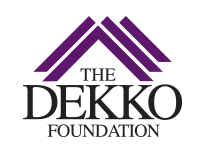Our Funding Priorities
At the Dekko Foundation, our mission is fostering economic freedom through education.
We believe children and young people from birth through age 18 are naturally wired to achieve economic freedom through their own development and by being in learning environments that support their self-sufficiency. When they have opportunities to connect their skills and talents to careers, they further their ability to create goods and services for others. It is through the creation of value for others within our democracy and free-enterprise system that they can earn, build, use, and share their wealth in the manner they choose. In other words, they have achieved economic freedom.
Through our grantmaking, we invest in the healthy development of children and young people and in environments that nurture their self-sufficiency. Using what we’ve learned over our four decades as a grantmaker and our understanding of the principles of child development, we have established a set of funding priorities that guides our work.
We want to invest in intentionally prepared learning environments that support children and young people in building knowledge, skills, and character.
Why this is a priority for us:
When environments are intentionally prepared to offer meaningful choice, freedom of movement, and activities that promote healthy development, children and young people can build knowledge, skills, and character that contribute to their own self-sufficiency and to achieving economic freedom later in life.
We want to invest in the use of developmental principles in homes, schools, and youth-serving organizations.
Why this is a priority for us:
When principles of child and adolescent development are evident, it shows that adults have stepped back and considered how best to meet the needs of each child.
We want to invest in opportunities for children and young people to develop meaningful relationships with caring adults.
Why this is a priority for us:
When children and young people have healthy, developmentally appropriate interactions with adults, they feel supported in their growth and learning, and have experience from which to form positive relationships with others.
We want to invest in parents’ understanding of their role as their child’s first and best teacher.
Why this is a priority for us:
When parents use developmental principles to guide their interactions, it can have a lifelong positive impact.
We want to invest in parents’ active involvement in the quality of their child’s education.
Why this is a priority for us:
When parents are engaged in their child’s education, they advocate for quality learning environments that support their child’s healthy development.
We want to invest in activities and experiences that bring families together.
Why this is a priority for us:
When family members have shared experiences, their relationships are strengthened, their horizons are broadened, and they are more engaged in their community.
We want to invest in communities that view children and young people as capable and provide opportunities for them to be involved.
Why this is a priority for us:
When communities recognize children and young people as valuable contributors, it creates opportunities for them to be engaged and form stronger bonds with others.
We want to invest in opportunities for children and young people to practice problem solving, particularly in ways that have real-world connections and applications.
Why this is a priority for us:
When children and young people practice problem solving, they build critical-thinking skills that support their self-sufficiency.
We want to invest in environments in which young people can follow their interests, build skills, and apply their knowledge and talents.
Why this is a priority for us:
When young people are in environments that invite self-directed learning and development, they see what they are capable of achieving and their potential for creating goods and services of value for others.
We want to invest in experiences in which young people gain real responsibility and take steps toward economic freedom.
Why this is a priority for us:
When young people take responsibility for their own decisions and actions, the lessons learned will aid them as they become adults.
We want to invest in young people knowing their options after high school.
Why this is a priority for us:
When young people understand their options for taking their next step after high school, they are empowered to make their own choices about how they can achieve economic freedom.
We want to invest in experiences in which young people grow their understanding of philanthropy by practicing it in their communities.
Why this is a priority for us:
When young people use their time, talent, and treasure for the good of others, they see how the choices they make can lead to positive change, and they build stronger connections to their community.
We want to invest in opportunities for young people to engage in civic responsibility and serve as leaders in their communities.
Why this is a priority for us:
When young people embrace the responsibilities of citizenship, they grow in their understanding of shared values, laws, government, and democracy.
We want to invest in opportunities that aid young people in their understanding of financial literacy.
Why this is a priority for us:
When young people build financial literacy skills, they learn the importance of producing more than they consume, as well as how their choices affect their ability to earn, build, use, and share their wealth and resources.

